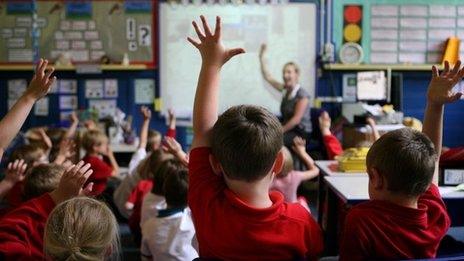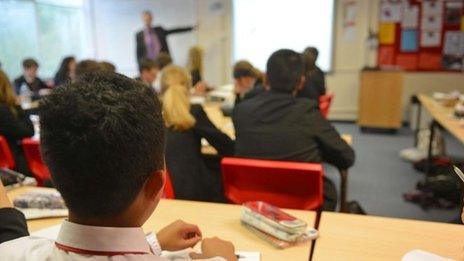Teachers' pay rise 'will spell cuts'
- Published

The pay review body said the climate was challenging for schools
Teaching unions have reacted angrily to a new pay deal, under which England's top teachers could get up to 2% rises.
The Department for Education published recommendations for the settlement in England, within the 1% pay limit agreed by ministers in 2012.
The deal means schools will be able to award the most deserving teachers more, but only out of existing budgets.
But teaching unions said as there was no extra money, many teachers would not get the standard 1% rise at all.
In its submission to government, the School Teachers Review Body said evidence presented to it confirmed the need for a pay rise to support the competitiveness of the profession.
'Best intentions'
It said its recommendations had been made amid a "challenging climate for schools, with tight budgets, demographics driving up pupil numbers and an increasingly competitive graduate labour market".
Christine Blower, general secretary of the NUT, said: "The STRB has acknowledged the NUT's concerns about teacher supply.
"It told the government very clearly that schools are having problems recruiting NQTs [newly qualified teachers] and experienced teachers alike.
"The STRB also sent a clear signal that it would have increased teachers' pay by more, if the government were willing to fund it."
She added: "The government's decision to freeze school funding means that even a 1% pay increase this year will lead to cuts elsewhere in schools - but its decision to allow schools to decide whether teachers get any increase means that many teachers may not even get 1%.
"The government has to reconsider its policy of cutting funding to schools.
"Schools need more funding and teachers' pay needs to rise.
"Otherwise, we simply won't have enough teachers to cope with growing pupil numbers."
Christine Keates, head of the NASUWT teaching union, said: "Whilst the review body may be acting with the best of intentions in seeking to introduce the opportunity for some teachers to receive up to 2%, unfortunately, this is still within the Treasury pay cap and takes no account of the fact that, thanks to the coalition government's changes to the pay structure, schools can use their pay flexibilities to seek to avoid paying teachers any award at all.
"Thousands of teachers face the prospect of being denied even the meagre cost-of-living award the review body is recommending."
'Attacks on pay'
She added: "A survey of NASUWT members found that by December 2014, 51% of teachers had not received the 1% cost-of-living increase last year, which should have been paid in September.
"The profession is already in the grip of a recruitment and retention crisis due to the coalition's relentless attacks on pay, pensions and working conditions.
"Today's announcement will do nothing to address this."
The exact pay of teachers in the maintained sector is set by schools but within nationally agreed levels.
Teachers received a 1% rise last year, in line with the two-year pay cap across the public sector introduced in 2012.
The 1% cap is to be extended to 2015-2016.
- Published12 March 2015

- Published10 March 2015
